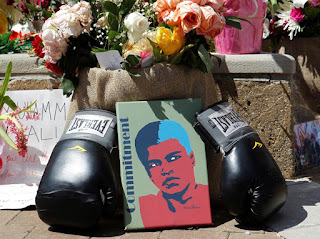“He who is not courageous enough to take risks will accomplish nothing in life – Muhammad Ali”
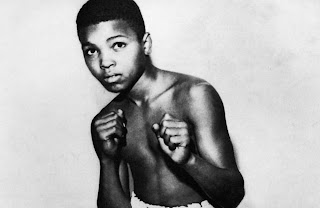 One step at a time, one punch at a time and one round at a time, that’s how Cassius Clay aka Muhammad Ali ruled the professional boxing ring. Born in ‘White America’, Ali became a hero of the underdogs and a hope for the African Americans. Self-proclaimed as ‘The Greatest’, few dared to contest his claim. And those who did lay at the gladiator’s feet. The man who floated like a butterfly and stung like a bee breathed his last after losing his final bout with Parkinson recently.
One step at a time, one punch at a time and one round at a time, that’s how Cassius Clay aka Muhammad Ali ruled the professional boxing ring. Born in ‘White America’, Ali became a hero of the underdogs and a hope for the African Americans. Self-proclaimed as ‘The Greatest’, few dared to contest his claim. And those who did lay at the gladiator’s feet. The man who floated like a butterfly and stung like a bee breathed his last after losing his final bout with Parkinson recently.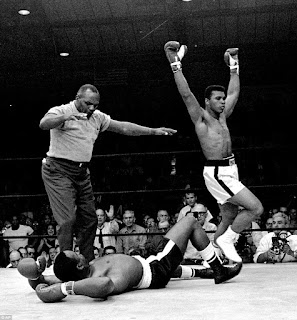 The legendary boxer was born as Cassius Marcellus Clay Jr in Louisville, Kentucky, US on 17th January, 1942. There have been many African origin athletes who have made their mark at the international stage but all pale in comparison with Ali. In 1960, he won his only Olympic Gold medal in the light heavyweight category by defeating three-time European Champion Zbigniew Pietrzykowski of Poland. Thereafter, he took up professional boxing and went on to upset the favorite Sonny Liston to claim his first World Heavyweight Boxing title in 1964. Later that year, the newly crowned champ decided to embrace Islam and adopted the name Muhammad Ali. Many Americans were livid with his decision and criticized him openly. Ali dropped his so-called ‘slave name’ to free himself from an oppressive regime.
The legendary boxer was born as Cassius Marcellus Clay Jr in Louisville, Kentucky, US on 17th January, 1942. There have been many African origin athletes who have made their mark at the international stage but all pale in comparison with Ali. In 1960, he won his only Olympic Gold medal in the light heavyweight category by defeating three-time European Champion Zbigniew Pietrzykowski of Poland. Thereafter, he took up professional boxing and went on to upset the favorite Sonny Liston to claim his first World Heavyweight Boxing title in 1964. Later that year, the newly crowned champ decided to embrace Islam and adopted the name Muhammad Ali. Many Americans were livid with his decision and criticized him openly. Ali dropped his so-called ‘slave name’ to free himself from an oppressive regime.
Actions have consequences
Much to his dismay, the US authorities stripped Ali of his Heavyweight title when the champ refused to be inducted into US Armed Forces in 1967. The US was locked in a bitter battle with the Vietnam forces at that time. This was followed by a charge of draft dodging for which he was sentenced to five years imprisonment along with a fine of $10,000. He had to surrender his passport too. Spirit broken, Ali decided to hang up his gloves in 1970.
The King returns
“I am America. I am the part you won’t recognize. But get used to me – black, confident, cocky; my name, not yours; my religion, not yours; my goals, my own. Get used to me”
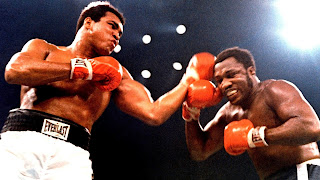 Ali suffered his first professional defeat at the hands of Joe Frazier in 1971. This was the only win Frazier managed against Ali in a series of three fights between themselves. The setback did not deter Ali. It made him much stronger. In 1974, he regained the coveted title by knocking out a previously unbeaten George Foreman in the eighth round. Sensing an opportunity, Frazier challenged Ali for his Heavyweight title in 1975. Dubbed as the ‘Thrilla in Manila’ by the man himself, Ali won the bout when Frazier’s chief second, Eddie Futch, conceded the fight in the 15th round after seeing that Frazier’s eye had shut down completely. Frazier lost, but he won Ali’s admiration and respect. This was amply exhibited when an ailing Ali made it a point to attend Frazier’s funeral in 2011 to pay his final respect. A year later, the champ decided to retire only to reverse his decision once again.
Ali suffered his first professional defeat at the hands of Joe Frazier in 1971. This was the only win Frazier managed against Ali in a series of three fights between themselves. The setback did not deter Ali. It made him much stronger. In 1974, he regained the coveted title by knocking out a previously unbeaten George Foreman in the eighth round. Sensing an opportunity, Frazier challenged Ali for his Heavyweight title in 1975. Dubbed as the ‘Thrilla in Manila’ by the man himself, Ali won the bout when Frazier’s chief second, Eddie Futch, conceded the fight in the 15th round after seeing that Frazier’s eye had shut down completely. Frazier lost, but he won Ali’s admiration and respect. This was amply exhibited when an ailing Ali made it a point to attend Frazier’s funeral in 2011 to pay his final respect. A year later, the champ decided to retire only to reverse his decision once again.
The final rumble
In Feb, 1978 Leon Spinks defeated Ali to claim the World title. A resurgent Ali, made a strong comeback 7 months later to beat the hapless Spinks and regain the Title for the third time. In doing so, Ali became the first three-time World Heavyweight Champion. This was followed by a third retirement announcement which was reversed later. In 1980, he was diagnosed with brain damage but Ali kept fighting. However, his fighting prowess kept waning. His last match ended in a 10-round loss to Trevor Berbick in December, 1981.
Ali, the crusader
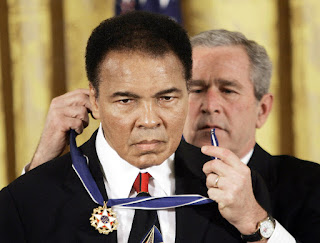 After being diagnosed with Parkinson in 1984, Ali decided to take the fight to the neurodegenerative disorder. He started an awareness campaign raising millions of dollars in the process for those afflicted with Parkinson. At the height of the US-Iraq conflict, Ali negotiated a successful release of 15 US citizens taken hostage by Saddam Hussein. In 1998, Ali was appointed the UN Messenger of Peace. Ali’s achievements finally gained American recognition when the then US President George W. Bush conferred on him the Presidential Medal of Freedom, America’s highest civilian honor.
After being diagnosed with Parkinson in 1984, Ali decided to take the fight to the neurodegenerative disorder. He started an awareness campaign raising millions of dollars in the process for those afflicted with Parkinson. At the height of the US-Iraq conflict, Ali negotiated a successful release of 15 US citizens taken hostage by Saddam Hussein. In 1998, Ali was appointed the UN Messenger of Peace. Ali’s achievements finally gained American recognition when the then US President George W. Bush conferred on him the Presidential Medal of Freedom, America’s highest civilian honor.
“Champions aren’t made in gyms. Champions are made from something they have deep inside them, a desire, a dream, a vision.”
The sharp-tongued boxer had the desire, dream and a vision to be ‘the greatest there has been, the greatest there is and the greatest there will ever be.’ He achieved his dream. Muhammad Ali will not be remembered just a fighter but also as a civil rights activist, philanthropist and above all a person who inspired people to believe in the impossible. Even in his death Ali continues to inspire millions around the world to fight for their rights, to bea champion in their own right.
